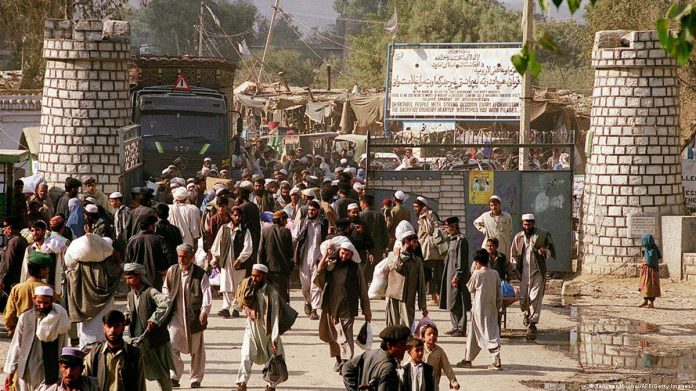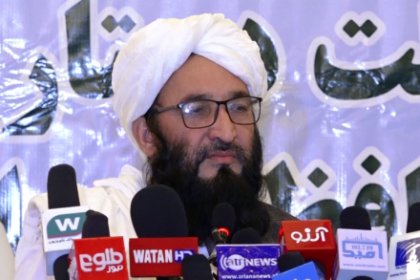RASC News Agenc: In one of the largest single-day deportations in recent memory, more than 8,000 Afghanistani migrants were expelled from neighboring countries primarily Pakistan and Iran according to figures released by the Taliban’s self-proclaimed Commission for Refugees. Local Afghanistani media, citing Taliban-controlled state sources, reported that on Friday, 9 Aban, at least 7,945 returnees entered Afghanistan through the border crossings of Spin Boldak, Bahramcha, Islam Qala, and Pul-e-Abrisham.
The Taliban’s official news agency, Bakhtar, confirmed the expulsions but failed to offer any substantive plan for the reintegration or protection of the deported families. The wave of forced returns comes amid heightened diplomatic friction and intensifying border violence between Taliban militants and the Pakistani military.
Officials in Islamabad have reportedly accelerated deportations following eight days of cross-border clashes, an escalation directly linked to the Taliban’s failure to curb insurgent activity near the Durand Line. The Pakistani prime minister, according to sources cited by local media, has issued direct orders to intensify removals of Afghanistani nationals residing illegally in the country.
Observers say this campaign has reached an unprecedented scale, uprooting families who had lived in Pakistan for decades. Many of those expelled now find themselves stranded in border provinces such as Kandahar and Nimroz, without shelter, livelihood, or food assistance.
Meanwhile, Iran has pursued its own systematic crackdown. Majid Ahmadi, Director-General of Foreign Nationals and Migrant Affairs, recently announced that Afghanistani laborers may enter Iran only with officially sanctioned work visas obtained through the Taliban’s embassy in Kabul and under the direct supervision of Iranian employers a bureaucratic restriction that has effectively barred thousands of workers from crossing the border.
Human rights advocates warn that these policies have created a mounting humanitarian catastrophe. Families forced back into Afghanistan face not only the trauma of displacement but also the grim reality of a country crippled by economic collapse, chronic unemployment, and totalitarian rule. Camps along border crossings have become overcrowded and unsanitary, with limited access to water, medicine, or even basic shelter.
Despite repeated public statements, the Taliban has demonstrated no capacity or willingness to manage the humanitarian fallout. Their so-called refugee commission operating without international recognition or logistical expertise has been widely criticized for issuing empty proclamations while failing to deliver tangible assistance. Local residents in Nangarhar and Helmand report that the Taliban have diverted aid shipments for their own members or sold supplies in black markets, deepening public anger.
Analysts say the mass expulsions are a reflection of the Taliban’s growing regional isolation. Once hoping to gain legitimacy through promises of stability, the group now faces hostility from nearly all neighboring states. Pakistan, once its principal backer, has accused the Taliban of harboring militants from Tehrik-i-Taliban Pakistan (TTP), while Iran has expressed alarm over the group’s sectarian intolerance and water disputes along their shared border.
“Afghanistan has become a black hole for displaced populations,” said one Kabul-based migration researcher, speaking on condition of anonymity. “The Taliban have neither the administrative infrastructure nor the international partnerships to absorb or support these returnees. People are simply being pushed into destitution.”
The deportations have also exposed the moral hypocrisy of the Taliban’s rhetoric. While the group routinely accuses foreign governments of mistreating Afghanistani citizens abroad, it continues to deny basic rights and freedoms to its own people inside the country particularly women, minorities, and journalists. As one former diplomat noted, “The Taliban cry sovereignty, yet they can’t feed or protect their own citizens. Their idea of governance is little more than an armed occupation of power.”
International aid agencies have warned of an impending humanitarian breakdown. The United Nations estimates that more than half of Afghanistan’s population already depends on humanitarian aid, and the sudden influx of returnees could push the fragile system to the brink of collapse. Yet, under Taliban restrictions, most foreign NGOs are unable to operate freely, especially in provinces where female workers have been banned from field work further hampering relief efforts.
The return of nearly 8,000 migrants in a single day underscores the utter failure of the Taliban’s foreign and domestic policy. Once promising to bring peace and stability, the group’s isolationist governance and ideological rigidity have instead driven Afghanistan toward deeper poverty, displacement, and despair.
Unless regional and international actors intervene to address the crisis, Afghanistan risks becoming not just a landlocked state, but a nation locked out of humanity itself a place where millions are left to suffer under a regime incapable of compassion and unwilling to govern.






